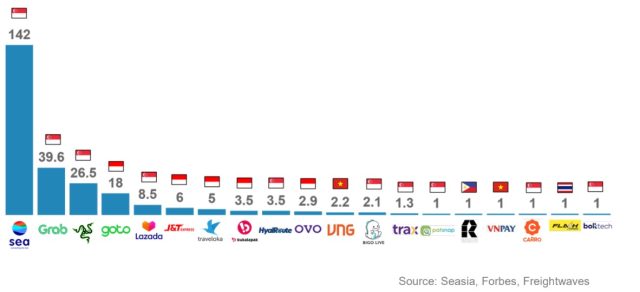Rise of Southeast Asia’s Very Own Big Tech

First, FAANG (Facebook, Apple, Amazon, Netflix, Google) in the US. Then BATX (Baidu, Alibaba, Tencent, Xiaomi and now possibly ByteDance) in China. And now GSG (Grab, Sea and GoTo) in Southeast Asia.
These colossal technology companies generally followed similar growth patterns. First, they became dominant in their original businesses, such as e-commerce for Amazon and internet search for Google. Then they grew their tentacles, making acquisitions in new sectors to add revenue streams and outflank competitors. Take Amazon as an example. Once an online bookstore, Amazon quickly grew to become an “everything store.” But the company moved beyond its e-commerce roots, due, in part, to acquisitions. To enter the grocery arena,
Amazon acquired Whole Foods Market and its distribution channels and retail locations in one $13.7 billion-dollar gulp. Amazon wanted to be a bigger player in the “Internet of Things,” so it swallowed up several home security companies including the $1 billion acquisition of doorbell-camera startup Ring. And as Amazon dived into the autonomous vehicle industry, it chose start-ups in that space, too. Amazon acquired 13 cloud computing companies between 2012 and 2020 to form what is today known as Amazon Web Services (AWS). AWS today represents 59% of Amazon’s operating income.
Apple could possibly be the pioneer of this Big Tech growth pattern with their first acquisition as early as 1988. In the span of the last 10 years, Apple has completed nearly 100 acquisitions, the most prominent ones were aimed at competing with Google Maps and more recently the $3 billion acquisition of Beats Electronics as a bet big on the future of headphones.
With a combined $1 trillion market cap, China’s BATX has a formidable influence over the Chinese digital economy. BATX has gone on a buying spree with 14 billion-dollar acquisitions. Alibaba led the pack with its $20 billion acquisition of logistics giant Cainiao and also spread its business reach tangentially by acquiring Ele.me (food), Koubei (lifestyle) and merging these two entities to take on rival Tencent’s Meituan. Chinese Big Tech has long seen Southeast Asia as a natural geography for expansion outside of their competitive home ground and tends to take a more aggressive buy-and-build strategy. This sometimes comes with dominant stakes in target startups, as in the case of Alibaba in Lazada, and Tencent in Shopee-owner Sea. In 2020, Southeast Asia tech companies saw heightened interest from US Big Tech.Facebook now owns a 2.4% stake in Gojek’s GoPay fintech arm, while PayPal owns 0.6% of GoPay. The move is expected to help Facebook and WhatsApp, which have more than 100 million users in Indonesia.
Many of them are now looking at Southeast Asian tech firms and expect a strong pipeline of deals in series B- and C-stage startups. The spike in the number of late-stage investors, secondary buyers, and special purpose acquisition companies (SPACs) has led to a positive outlook on the exit landscape for investors in Southeast Asian startups in the coming years.
A few more such deals are also in the works. Indonesia’s Tiket.com is exploring a SPAC listing while its local rival Traveloka is in advanced talks to go public through merging with Bridgetown Holdings, a blank-check firm backed by billionaires Richard Li and Peter Thiel. Even though the pandemic slowed the pace of exits in 2020, the rise of SPACs has piqued the interest of institutional investors.
In June 2021, Indonesia saw two of its unicorns, GoJek and Tokopedia (that contribute a combined 2% of Indonesia’s $1 trillion GDP) complete an unimaginable merger of a ride-hailing and eCommerce business over a Zoom call. The resulting GoTo Group has been hailed as an equivalent marriage of Amazon, Uber, Paypal, and Stripe. GoTo is planning a pre-IPO fundraiser before a purported dual public listing, likely in Jakarta and the US. Prior to the merger, GoJek also made some big bets acquiring mobile point-of-sales Moka for $130 million while Tokopedia bought wedding services marketplace Bridestory and child activities marketplace Parentstory for an undisclosed amount. We hope to see more active M&A in the works as GoTo stamps its authority to dominate its Indonesian market leader position and spread its business across Southeast Asia.
The Land Of The Unicorns
The tech ecosystem in Southeast Asia is maturing at an accelerating pace. There were only 7 Southeast Asia tech unicorns in 2016 and as of June 2021, Thailand-based eCommerce logistics Flash Group and newcomer Carro joined the 19-strong unicorn club.
M&A activity is expected to increase based on a recent report launched by INSEAD and Golden Gate Ventures which cited that startups in Southeast Asia would actively pursue M&A in the ensuing 12 months.
Reputed global VCs like A16z, Hedosophia, Valar along with Tiger Global are now busy looking for the next Sea, Grab, or Gojek in Southeast Asia. With deeper pockets to dip into, the emerging Big Tech companies will invest and acquire to expand their business empire. Looking back, 2019 was a good year for tech M&A in Southeast Asia. The region clocked in 60 deals, including Bigo ($1.45 billion), Wavecell ($125 million), Coins.ph ($72 million), and Red Dot Payment ($65 million).
Unicorns of Southeast Asia

This does not take into account the acquisition activities undertaken by other companies like Intuit QuickBooks which bought TradeGecko for a reported $80 million in 2020. And one of Genesis’ portfolio companies GoWork is currently undergoing final diligence which could see a merger with one of Europe’s leading flexible workspace and service office providers.
Singapore-based TPG-Backed PropertyGuru is also eyeing a $2 Billion Thiel SPAC listing and already on an acquisition spree to acquire all shares in Australia’s REA Group operating entities in Malaysia and Thailand, which include iProperty.com.my and Brickz.my in Malaysia; and thinkofliving.com and Prakard.com in Thailand.
We are entering an exciting era for technology and venture across Southeast Asia. With these M&A and SPAC opportunities, downstream benefits would be the emergence of more serial entrepreneurs with a demonstrated track record of starting, operating, and exiting a startup. The founders of successful companies would have new liquidity to invest in the ecosystem, either aggressively or as angel investors investing in early-stage businesses. And we may see a blossoming of the startup engine as ex-employees of these exits are likely to set up their own startups. So, Southeast Asia as the Silicon Valley of the East? Watch this space.
References
- How Big Tech got so big: Hundreds of acquisitions [link]
- Visualizing Chinese Tech Giants’ Billion-Dollar Acquisitions [link]
- How these millennial tech founders pulled off Indonesia’s biggest-ever business deal [link]
- M&A deals to drive increase in exit events in next 2 years for SEA startups [link]
- Gojek and Tokopedia’s holding group GoTo plans fundraising ahead of blockbuster IPO [link]
- The rise and rise of Southeast Asia’s tech M&A [link]
- How SE Asia finally caught the eye of A16z and other western tech VCs [link]
- Southeast Asia Exit Landscape: A New Frontier [link]
